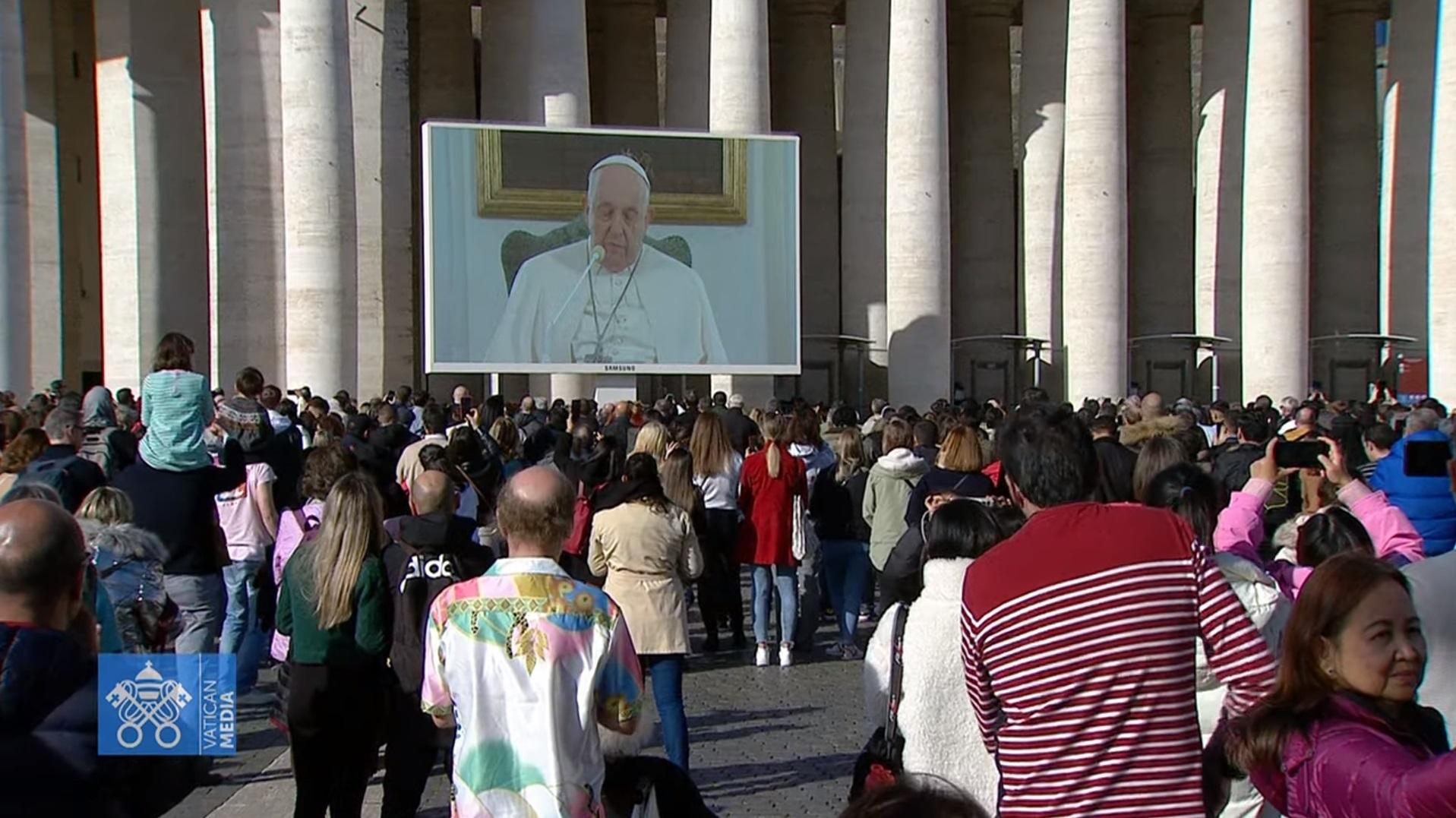ROME – Pope Francis on Sunday recited his noontime Angelus address from his private residence rather than Saint Peter’s Square in order to avoid changing temperatures, as he continues treatment for what the Vatican has described as lung inflammation caused by bronchitis.
Speaking via a video connection from the Vatican’s Saint Martha guesthouse where he lives, the pope said, “Today I still cannot read everything. I am getting better, but my voice does not allow it.”
Last Sunday the pontiff also delivered the address via livestream, rather than from his usual post at the window of the papal apartment overlooking St. Peter’s Square, appearing on screen with an IV through which he was receiving antibiotics for what the Vatican had described as a “mild flu” causing lung inflammation.
During Sunday’s livestream, the IV connection on the pope’s hand visible a week ago no longer appeared.
Describing his illness as “a very acute, infectious bronchitis” during a Nov. 30 seminar on ethics in healthcare management, Pope Francis has been holding meetings and audiences as usual, but has been unable to read his prepared speeches, and has depended on aides to read them for him.
Both last Sunday and during his Dec. 3 Angelus address the pope’s prepared remarks were read aloud by Italian Monsignor Paolo Luca Braida, an official of the Vatican’s Secretariat of State.
According to a Dec. 2 statement from the Vatican, the pope’s conditions “are improving, the pope does not have a fever” and he continues to receive antibiotic treatment.
The decision was made for him to recite his Angelus address on Sunday, which marked the beginning of the church’s liturgical Advent season, in private “to avoid exposure to temperature changes.”
Francis himself during the week said the risk of potential sharp changes in temperature due to the hot environment and indoor air conditioning was the reason why he cancelled his Dec. 1-3 trip to Dubai for the COP28 United Nations climate summit.
Following his reflection on the day’s Gospel reading and after leading faithful in praying the traditional Angelus prayer, the pope again issued an appeal for peace in Israel and Palestine, saying the situation “is serious.”
He lamented that a short-lived truce has ended, and while he recognized that many of the hostages abducted during Hamas’s Oct. 7 offensive against Israel had been freed, he said “many remain in Gaza.”
“Let us think of them, of their families, who saw a light, a hope to again embrace their loved ones,” he said, and also offered prayers for the citizens of Gaza, saying, “There is much suffering in Gaza, basic necessities are lacking.”
Pope Francis voiced hope that all parties involved in the conflict “can reach a new ceasefire agreement and that different solutions can be found other than weapons, seeking to follow courageous paths of peace.”
He also offered prayers for the victims of a bombing at a Catholic church in Mindanao, in the Philippines, during a Mass on Sunday morning, which has so far left four people dead. The attack took place during a Mass held in the gymnasium of Mindanao State University in Marawi, the country’s largest Muslim city.
The pope expressed his condolences and assured of his closeness to the Philippines and the people of Mindanao, “who have already suffered much.”
Noting that Sunday also marked the international day for people with disabilities, Francis said showing closeness to the disabled “helps culture as a whole to become more human” and asked that within families, parishes, schools, places of work, and within sports, “every person with their qualities and abilities” would be valued and that no one would be excluded.
Though unable to attend the COP28 climate summit in Dubai, Pope Francis, who earlier on Sunday sent a video message for the inauguration of the Faith Pavilion at the event, issued an appeal “so that climate change is responded to with concrete political change.”
“Let us break free of the constraints of particularisms and nationalisms, and schemes of the past. Let us embrace a common vision, let us all commit now without delay for a necessary global ecological conversion,” he said.
Follow Elise Ann Allen on X: @eliseannallen












